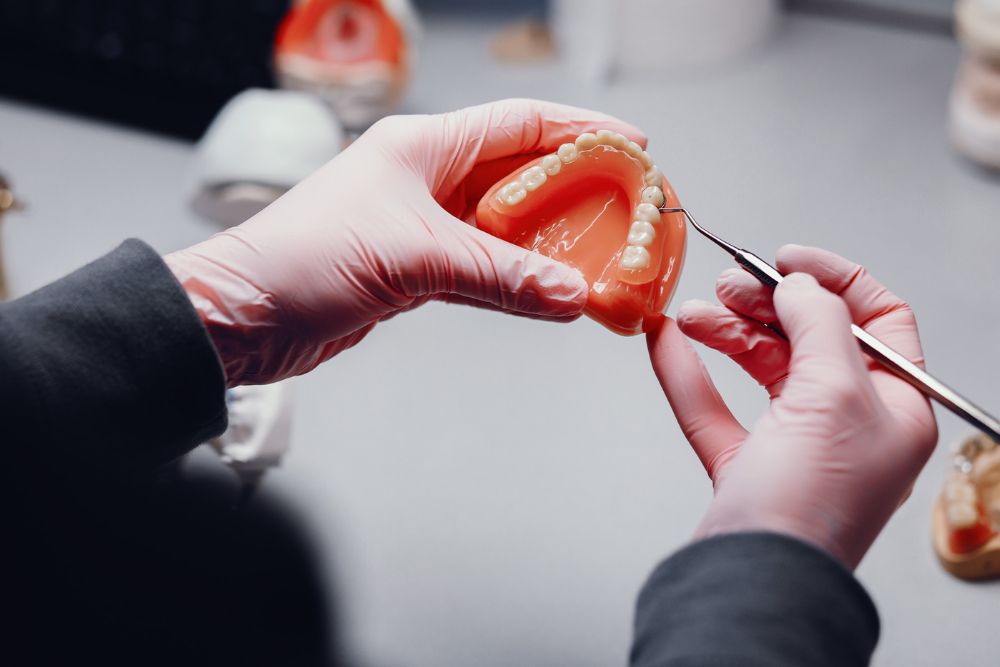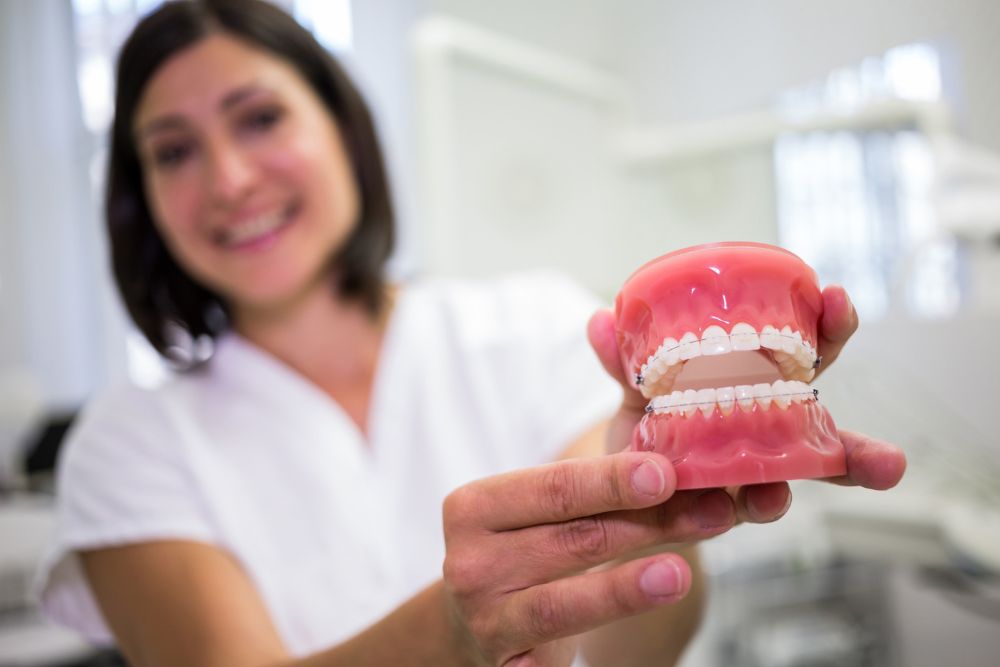Dental implants and dentures have one major similarity: they are meant to replace missing teeth. Other than that, these two options differ in terms of functionality, cost, and the overall process. So, which one should you choose?
This blog post will compare these two procedures in terms of maintenance, cost, and longevity of results. This way, you can decide which one you believe better suits your needs.
Content Navigation
- What Are Dental Implants?
- What Are Dentures?
- What Are The Advantages Of Dental Implants?
- What Are The Disadvantages Of Dental Implants?
- Is Getting Dental Implants Painful?
- Are You Put To Sleep When Getting Dental Implants?
- How Long Do Dental Implants And Dentures Last?
- How Do You Maintain Dental Implants And Dentures?
- Cost Comparison Of Dental Implants And Dentures
- Are Dental Implants Or Dentures Better For Me?
- Final Thoughts
What Are Dental Implants?

Dental implants are screw-like metal posts that are placed into your jaw bone through oral surgery and act as a replacement for your natural tooth roots. They can either be made from titanium or zirconia, which are both biocompatible materials. Implants provide support for prosthetic teeth, either dental crowns, dental bridges, or dentures.
What Are Dentures?
Dentures (also called false teeth) are artificial teeth supported by gum tissue, which can either be removable or fixed in place. Removable dentures are held in place by the suction between your gums and the denture, while fixed dentures (also known as bridges) are attached to adjacent teeth on either side of the gap.
There are two types of dentures, such as:
- Custom Mouthguards
These types of dentures can be removable or fixed. They are meant to replace one or more missing teeth and are usually attached to your natural teeth with metal clasps or dental crowns. They help provide a feeling of natural teeth and also help to keep your other teeth from shifting position. - Complete Dentures
These are used when you need to replace an entire arch of teeth (either the upper or lower). They fit snugly over your gums and provide support for your cheeks and lips. They can be either “conventional” or “immediate.” Conventional dentures are placed in the mouth 8-12 weeks after all the remaining teeth have been removed, while immediate dentures are inserted on the same day the teeth are extracted.
It’s worth noting that while these can be an affordable way to give you a nice smile, one of the major cons of dentures is that, over time, they can become loose and may need to be replaced. In addition, they need to be taken out and cleaned every night.
What Are The Advantages Of Dental Implants?
- Increased stability:
Dental implants are more stable than traditional dentures as they are anchored to the jawbone. This means there is no risk of them slipping or moving around in your mouth, which can be a major inconvenience. - Improved speech:
Poorly made and ill-fitting dentures can cause you to mumble or slur your words. This is not an issue with dental implants, as they are securely in place. - Enhanced comfort:
Because dental implants are placed directly into your jawbone to support replacement teeth, they feel like your real teeth. In addition, dentures can rub against your gums, which can cause irritation. - Improved oral health:
Implants do not require a reduction in the size of your adjacent teeth, as is necessary with fixed dentures. They also do not rely on surrounding healthy teeth for support, so they do not put unnecessary stress on these teeth. - They can reduce bone loss:
When you suffer from tooth loss, the bone around it begins to shrink. This can make your face change shape and make you look older. Implants help preserve the bone and prevent further bone loss. - Improved chewing function:
Dental implants allow you to bite and chew just as you would with your natural teeth since they are securely anchored.
What Are The Disadvantages Of Dental Implants?
Along with the benefits, there are also cons to implants, as follows:
- They require surgery:
Implant treatment is a surgical or invasive procedure, which means there is a risk of infection, bleeding and associated pain. - They can be expensive:
Implants can be costly, especially if you require multiple implants. - They have a long treatment time:
The entire process, from start to finish, can take several months, usually from 5 to 9. It is even longer if you need other procedures, such as dental bone grafting. - They are not for everybody:
Implants are not suitable for everyone, and your eligibility will be determined by various factors, including your overall health, the condition of your jaw bone and whether you are willing to undergo surgery. For instance, having gum disease or diabetes can make you unsuitable for dental implants.
Is Getting Dental Implants Painful?
The pain level you experience during and after dental implant surgery will depend on your individual pain threshold. Typically, the procedure is carried out under anaesthesia, so you shouldn’t feel any pain during surgery. You may experience discomfort and swelling afterwards, but this can be alleviated with over-the-counter painkillers. In a few to several days, this should subside with enough rest and proper care.
Are You Put To Sleep When Getting Dental Implants?
Normally, a patient of dental implant treatment receives local anaesthesia, which numbs the area around the implant site. This means that they stay awake but experience no pain during the procedure. However, sedation anaesthesia may be used if the patient experiences anxiety or has a low pain threshold. There are different sedatives you can choose, including:
- Inhaled minimal sedation:
You breathe in nitrous oxide or laughing gas through a mask, which makes you calm and relaxed. During your surgery, you remain awake but will not remember much about the procedure. Ten minutes after removing the mask, this sedative’s effects wear off. - Oral sedation:
Also called conscious sedation, you take a pill one hour before your surgery. Depending on the dosage, the pill makes you drowsy during surgery but can be awakened to respond to your dentist’s commands when needed. - Intravenous (IV) sedation:
Medication is injected into a vein in your arm, which puts you to sleep. You may not remember much of the surgery and will likely feel groggy when you wake up. - General anaesthesia:
This is usually used for more complicated dental implant surgeries, which puts you to sleep for the entire duration of the surgery. This needs constant monitoring of your vital signs by an anesthesiologist so that the level of anaesthesia can be adjusted as needed.
How Long Do Dental Implants And Dentures Last?
On average, dental implants can last up to 10 to 15 years. However, their lifespan can be up to 25 years or more with proper care.
On the other hand, dentures can last up to 7 to 10 years. They may have to be relined or repaired within this time, but it is ideal to have them replaced after years of wear.
How Do You Maintain Dental Implants And Dentures?

Here’s a summary of the proper care to maintain implants and dentures:
Dental Implants
- Brush at least twice a day with a soft-bristled toothbrush and low-abrasive toothpaste to remove plaque and avoid tooth decay.
- Flossing should be part of your daily routine to remove plaque and food particles from between your teeth.
- Maintain a consistent visit to your dentist twice a year for regular checkups and professional cleaning.
- Use an oral irrigator to remove plaque from areas that are hard to reach with a toothbrush.
Dentures
- Clean your dentures every day with soap and water or a denture cleanser to remove plaque and food particles.
- Brush your gums, tongue and roof of your mouth with a soft-bristled brush twice every day.
- Rinse your mouth with water after every meal.
- Remove them at night to allow your gums to rest.
- Clean your dentures thoroughly before putting them back in your mouth.
- Similar to implants, visit your dentist regularly for professional cleaning and checkups.
Cost Comparison Of Dental Implants And Dentures
The cost of both procedures varies depending on the number of teeth that need to be replaced, the type of dental implants or dentures used, the need for additional procedures, and your location.
In general, the cost of implants per tooth may range from $3,000 to $5,500. A 2020 national dental fee survey says that you can expect to pay $5,514 for a single tooth. These costs can be higher if you require other treatments, such as bone grafts and sinus lifts.
On the other hand, the cost of dentures can be up to $4,000 for a full set of lower and upper and up to $2,200 for either lower or upper dentures.
Are Dental Implants Or Dentures Better For Me?
This depends on a few considerations, including your budget, oral health, and preference. If you are eligible, have the funds for it, and want a longer-lasting option, dental implants may be best for you. Overall, this treatment option has high success rates, and the benefits of implants outweigh the cons.
If you don’t have the budget for implants, dentures may be an ideal tooth replacement option. However, you must remember that you will have to replace them more often. There is also the possibility of them causing discomfort and becoming loose over time.
Final Thoughts
Dental implants and dentures are both excellent ways to replace missing teeth. However, while dental implants are a more expensive option, they offer numerous benefits. They are more durable, fit securely in your mouth, and feel more natural. Dentures, on the other hand, are a more affordable option but must be replaced every ten years. They may also slip out of place, which can cause discomfort and embarrassment. In the end, the most suitable option for you depends on your choice, budget, and oral health.
If you have missing teeth affecting your quality of life, talk to us by dialling 08 9349-0800.
You can book a consultation where one of the dentists at Comfort Care Dental will thoroughly examine your mouth to determine which treatment option is right for you. They will also discuss dental implants and dentures, including their pros and cons, risks, and the cost of each treatment. This allows you to make an informed decision about which treatment to choose.
